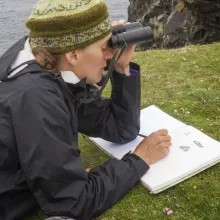Socrates Summer Seminars
Socrates Seminars begin with an opening reception on Friday evening, and conclude Monday afternoon following the final seminar session. The weekend program consists of three four-hour seminar sessions with free time and activities each afternoon. Participants select one seminar topic to attend for the entirety of the weekend. The seminar tuition is $2,000. Scholarships are available by application.
Intelligence, Espionage and American Foreign Policy [*New Seminar*]
September 11, 2001, was the greatest strategic surprise perpetrated against the United States since the attack on Pearl Harbor carried out sixty years earlier. In both instances there was pressure for governmental reform and ultimately the creation of new intelligence institutions. How did 9/11 happen and how, in less than two years after, did the United States manage to embroil itself in a prolonged conflict in Iraq based on erroneous assumptions about the existence of weapons of mass destruction in that country? These events led to a major reorganization of the seventeen agencies and organizations that comprise the U.S. Intelligence Community (IC) and the creation of a Directorate of National Intelligence. Yet is our country safer today than it was on 9/11? What are today’s most critical intelligence challenges, and how effective are the nation’s collection, analysis, and operational capabilities? Where is America vulnerable to new forms of strategic surprise?
This seminar examines the theory and practice of intelligence, as well as its relationship to American national security decision-making. Topics include case studies of intelligence successes and failures from World War II to the present, as well as current intelligence challenges with respect to terrorism, cyberattacks, nuclear proliferation, and other emerging threats. This seminar also will reflect on the legal and ethical dimensions of intelligence, the role of congressional oversight, and the tensions between government secrecy and transparency in a democracy.
Moderators: Amb. John Negroponte, Distinguished Professor at the Miller Center for Public Affairs at the University of Virginia, diplomat, and first-ever Director of National Intelligence;
Edward “Ted” Wittenstein, Director of International Relations & Leadership Programs and Executive Director of Johnson Center for the Study of American Diplomacy at Yale University.
What is Privacy and How Do We Protect It?
Can innovation and convenience co-exist with privacy? Societies globally are grappling with this question. And the stakes involved are high. As Apple’s CEO Tim Cook recently wrote, “[r]ealizing technology’s potential depends on it.” So might our sense of self and what we think of as our human rights. What kinds of laws, standards, and practices can effectively safeguard privacy while allowing for value creation using consumer and citizen data? What are the strengths and potential weaknesses of Europe’s comprehensive regulatory approach to data protection? What is the future of privacy law and regulation in the United States and beyond? What role do engineering and design thinking disciplines play in addressing privacy? What do we even mean by “privacy” anyway? Seminar participants will develop a nuanced understanding of the current public policy debates underway including historical and legal context. The seminar will also arm participants with conceptual and operational frameworks for analysis of and action on the key privacy problems they are likely to encounter in their leadership roles.
Moderator: Harriet Pearson, Partner at Hogan Lovells, is a privacy and cybersecurity practitioner with over two decades of experience advising companies and boards and considers herself a practical privacy advocate.
Cat Herding 101: Leading Complex Organizations in Uncertain Times
This seminar will explore the challenges involved in leading complex 21st century organizations in which different kinds of groups carry out diverse activities in a decentralized fashion, not fully controlled by a single authority. While such organizations have an extended group of leaders that carry out unit-specific goals, there is still a need for coordination, collaboration, and communication as well as strategic priority setting in service of a larger mission, all in the context of rapidly changing times and business models. Under these circumstances, effective leaders must have strong interpersonal skills, good personal awareness, and deep knowledge of the people in the organization. They must also have the skills to use that knowledge in practical and flexible ways.
This seminar will examine alternate theories of leadership and differing perspectives on organizational change and challenges with the goal of better understanding potential matches or mismatches between personal leadership styles and organizational culture and demands. Using a highly interactive approach, including classroom conversations, exercises, and group work, participants will come to better understand their own leadership style, develop a personal leadership philosophy, with an eye on how best to motivate and “herd” a broader leadership team and build a values based and mission driven organization.
Moderator: Ana Mari Cauce is an American psychologist, college administrator, and the 33rd and current president of the University of Washington.
Learning from Lincoln: The Business, Politics and Art of the Nation’s Greatest Leader
Abraham Lincoln is the nation’s greatest leader and one of its greatest writers and orators. This seminar focuses on Lincoln’s great speeches and public letters. They provide a road map not only for understanding how Lincoln evolved as a leader, but for helping us to become better leaders. Lincoln defined leadership as the art of the possible. The methods that distinguished him as a leader are crucial for leaders today. And the critical issues of Lincoln’s time remain the critical issues of our time: the function and limits of government; meanings of freedom and equality; the limits of civil liberties; and the ways in which blacks and/or other minorities alter or transform society or an organization. Each session focuses on a speech or public letter by Lincoln that raises critical issues about a problem both in his time and ours, and that offers ways to address the problem.
Moderator:
John Stauffer, the Sumner R. and Marshall S. Kates Professor of English and of African and African American Studies at Harvard University, is an award-winning teacher and best-selling author of GIANTS: The Parallel Lives of Frederick Douglass and Abraham Lincoln.
Lies, Bots and Social Media: The Lost Promise of the Internet and How We Can Restore It
We have a conflicted relationship with our electronic media. At a time when fully half of the world’s population is connected to the Internet, it is hard to escape the conclusion that the technology that promised to give power to the powerless has ended up also hurting the very people it was supposed to help. Openness allowed the Internet to become a global network that has fostered extraordinary innovation and empowered entrepreneurs, consumers, and political organizers. But along the way, some of the openness was lost, and darker forces took root. In this seminar, we will consider digital platforms that organize the user experience, the presence of disinformation and bots, and the vast prevalence of the Internet in daily life. We will delve into impacts on democracy and authoritarianism as the Internet’s capabilities are deployed globally. How have policy makers failed to keep up with an increasingly centralized and expanded Internet? Is it feasible to think regulations can be put in place? How has the news media adapted to this new medium – for better or worse – and what are the consequences for people around the world?
Moderator: Karen Kornbluh, director of the technology policy program and senior fellow at The German Marshall Fund.






